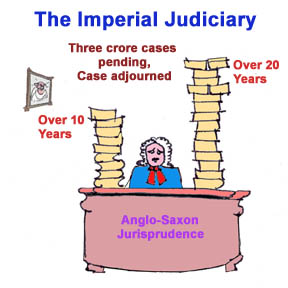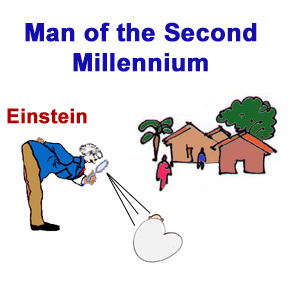Ethics
of the Legal Profession
|
Inspired
by the Government of India Act of 1935, our Constitution is based on a faulty
Westminster system and exploitative colonial institutions. The Constitution, in
essence, states that we, the people of India, assign all our resources to the
state and national governments, authorise our elected servants to take all
decisions, keep them secret from us, and appoint an overbearing bureaucracy not
accountable to us to rule over us at the local level. We, the people of India,
may be poor and illiterate but would have to be morons to give to ourselves,
such an anti-people Constitution. We never gave it to ourselves. It was imposed
on us and authenticated in our name in criminal breach of trust.
Such authentication is similar to an attorney usurping all the property of a
client by obtaining his thumb impression. The client can seek relief from the
courts by establishing that the thumb impression had been fraudulently obtained.
The members of the Constituent Assembly were all national leaders of high
integrity. The Constitution adopted by them in the name of the people however
lacks legal and ethical legitimacy.
The Parliament can make amendments but does not have the power to institute a
new constitution. There is also no legal method by which another constituent
assembly can be convened. Only the sovereign people can do so through
referendum. In fact, it is now a legal and ethical necessity that a
legitimate Constitution based on the wishes and aspirations of the people is
instituted through referendum. If this were not so, it would imply that a
Frankenstein in the form of an anti-people Constitution that can destroy its
creator, the people, had been instituted, and the sovereign people can do
nothing about it. A law that makes the
sovereign impotent is a bad law.
It is most unfortunate that former judges
and senior lawyers avoid expressing legal opinion in regard to this obvious
fraud on the people of India. Senior Advocate Fali Nariman said in a lawyers’
meet "Constitution Assembly" that we should be grateful to the
almighty that we have the present Constitution. His statement provides little
solace to the suffering rural women and to the impoverished rural children
migrating to cities to be abused.
The people of India shall always be grateful to Shri PA Sangma, MP, a lawyer by
profession, who as Lok Sabha Speaker shared our concern for good governance by
circulating our document for consideration in the historic golden jubilee
special session of parliament. Of special significance are the views of Justice
MN Venkatachaliah in a message on the right of the people to referendum. The
reflections of Digvijay Singh, Chief Minister, Madhya Pradesh, Arun Jaitley,
Union Law Minister, and Maneka Gandhi, Minister Social Justice, with whom we
interacted, strengthened our convictions.
The legal profession as a whole has however shown crass lack of professional
ethics. We request former judges and senior advocates, especially the Attorney
General of India, to either endorse our logic or refute it in writing on sound
legal grounds.
Global
Rejuvenation in 21st Century
Science and technology have, in the twentieth century, opened frontiers capable
of unprecedented good to the society. They have also unleashed tools that can
destroy the world. The forces generated by capitalism, centralised socialism,
pseudo democracies, neo fascism, dictatorships and ethnic conflicts have set the
world on the course of self-destruction. All contemporary dialogue on
sustainability is superficial and ineffective.
|

|
|
Gandhi-Apostle
of the Third Millennium |
|
Objective of
the society should be to attain a high level of human development.
Technology can change lifestyles, but not necessarily the quality of human
existence |
All religions have advocated an egalitarian society founded on empowered
grassroots democracy. The sages of India instituted such religion-enriched
egalitarian society since last 4000 years, symbolised in the rule of the epic
monarch Ram, called "Ram Rajya". Such governance was advocated by
sages of most faiths and forcefully reiterated by Mahatma Gandhi in the
twentieth century. Unfortunately human greed and abuse sidelined such wise
advice.
The solution for global sustainability lies in nurturing a religion-enriched
egalitarian society through true grassroots empowerment, that is, village and
urban neighbourhood parliaments consisting of all adult men and women control
local resources and decision-making, under the coordination of district, county
or municipal governments. They devolve a stipulated percentage of their
resources to the state and national governments for providing higher level
infrastructure and coordination under effective transparency mechanisms.
All social issues including religion are thus in grassroots jurisdiction,
coordinated within the local level. The world will then become a confederation
of peace-loving, self-reliant, sustainable local governments.
People First has
launched a campaign for organising opinion polls along with forthcoming local
and state elections on the present system versus Gram Swaraj, followed by
reforms through referendum.


